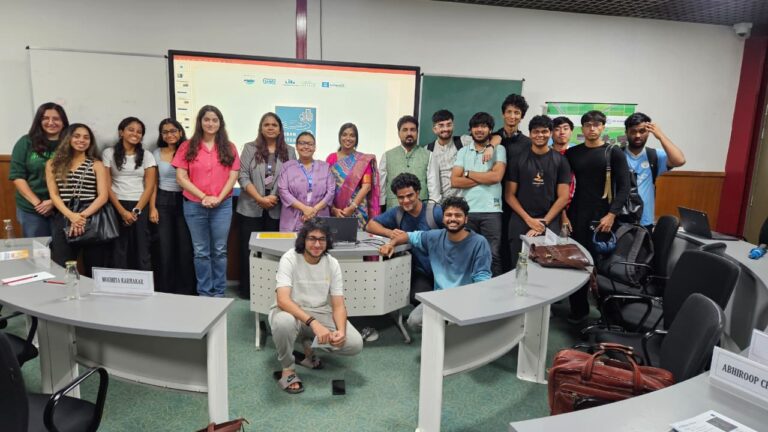The River Cities Alliance (RCA) Secretariat continues to strengthen its engagement with academic institutions to build awareness and capacity around urban river management. In line with the Urban River Management Framework — jointly developed by the National Institute of Urban Affairs (NIUA) and the National Mission for Clean Ganga (NMCG) — the Secretariat aims to foster a deeper understanding of urban water systems among students and future professionals.
As part of this initiative, Dr. Moumita Karmakar, Senior Programme Associate, NIUA, delivered a guest lecture at O.P. Jindal Global University for first-year students pursuing a B.Sc. in Environmental Science and Sustainability. Her session, “Introduction to Urban Rivers: Challenges and Management,” provided students with an overview of the complex relationship between cities and their rivers, highlighting the environmental and social challenges associated with urbanisation.
The lecture was followed by an interactive workshop led by Ms. Jyoti Verma, Senior Research Specialist, NIUA, on “Water Body Rejuvenation for Urban River Management.” The session introduced students to the Urban Waterbody Diagnostic Tool, developed collaboratively by NIUA, UNESCO New Delhi, and NMCG. Students learned that rivers, lakes, ponds, and wetlands form an interconnected urban water network—where rivers act as main channels and smaller water bodies play crucial roles in water storage, groundwater recharge, biodiversity support, and local climate regulation. These ecosystems also aid in flood control, provide water for multiple uses, offer recreational spaces, and support livelihoods. However, rapid urbanisation has led to the alarming loss, pollution, and encroachment of many such water bodies. The Urban Waterbody Diagnostic Tool helps assess the condition of urban water bodies across four dimensions—Physical, Chemical, Biological, and Management—using both outcome-based and process-based indicators. The workshop encouraged students to apply these concepts to real-world contexts and explore solutions for urban water resilience.
Both sessions saw enthusiastic participation from over 45 students, who engaged actively in discussions and demonstrated a keen interest in sustainable urban water management.




